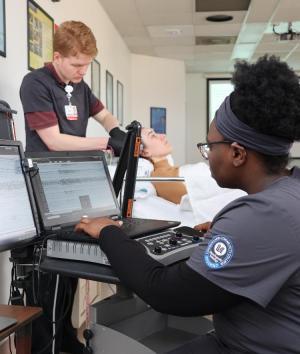Getting a start and advancing in health care
Those going into health care have an opportunity to make a positive impact on people’s lives in a career field where opportunities abound. LLCC has many health care training options to choose from — whether you’re looking to get your foot in the door or advance your career.
Neurodiagnostic technology
One such opportunity is in neurodiagnostic technology (NDT) in which you learn to capture information about the brain and nervous system to help physicians identify and diagnose conditions. EEGs are used to record electrical activity of the brain.

LLCC’s NDT program is one of only 30 programs across the country. It offers a 12-month certificate option to get started in the field as an EEG technologist as well as a two-year degree. Courses are provided in online and hybrid formats.
“This gives students the most flexibility to complete their coursework around the days they are in clinicals. Our program currently has clinical sites in Springfield, Peoria, Champaign, Mattoon and St. Louis,” explains Diane Wilson, NDT program director. “We’re working to meet students where they are.”
“I want to study epilepsy in the future, and NDT provides a good start,” explains Desola Akpan. “The 12-month program is great because you can quickly get to work while still having the option to pursue the degree afterward. There are so many places you can work."
In addition to studying NDT, Jon Mastin does a lot of volunteering. “The year-long program works out great with my plans and schedule, and the hybrid classes provide flexibility,” he says. “Everyone in the program is super helpful.”
Clinical medical assistant
Another opportunity is that of clinical medical assistant (CMA). Most CMAs are employed in doctor’s offices, but there are also opportunities in clinics, labs and insurance companies.
Kaytlyn Gougis is teaching the CNA to CMA bridge program (11 weeks, plus 60 hours of externship) at LLCC locations in Springfield and Jacksonville. “The work you do typically includes taking patients from the waiting room to the exam room, taking vitals, finding out why they’re in to see the doctor and, depending on the reason for the visit, possibly performing an EKG, removing sutures or assisting with minor office procedures. Medical assistants can also perform clerical duties. No two days are exactly the same. You’ll never get bored.”
Gougis is a 2019 graduate of LLCC’s CMA program herself. “I had already earned an associate in science degree from LLCC. I was looking for a steady job with good hours, pay and benefits, and needing hands-on, health care experience. Initially, I was thinking phlebotomy, but LLCC’s program was full. So I enrolled in the clinical medical assistant program. I received good, positive, constructive feedback to prepare for my career, and there were so many opportunities during the semester for hands-on learning.
“I now love working with students, seeing how they grow and better themselves,” she adds. “The clinical medical assistant field has grown rapidly. Our students are getting offered jobs before even graduating, to work as uncertified medical assistants until they finish the program.
This fall, the CNA to CMA program will be available at LLCC’s Springfield and Litchfield locations, and the CMA program will be available at Springfield and Jacksonville.
